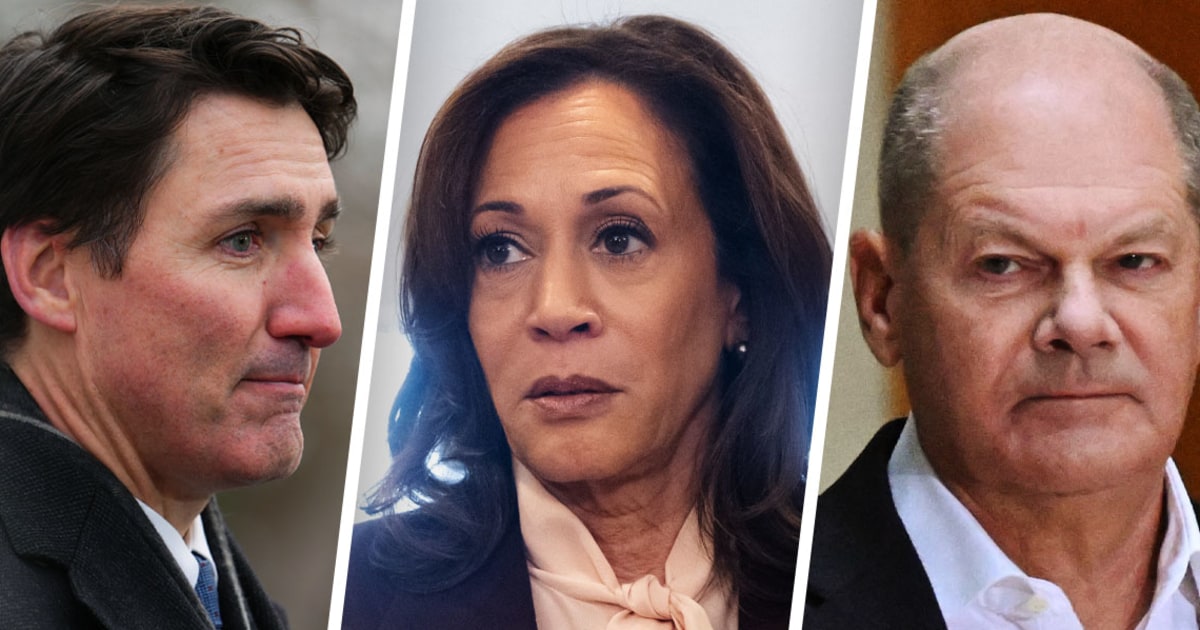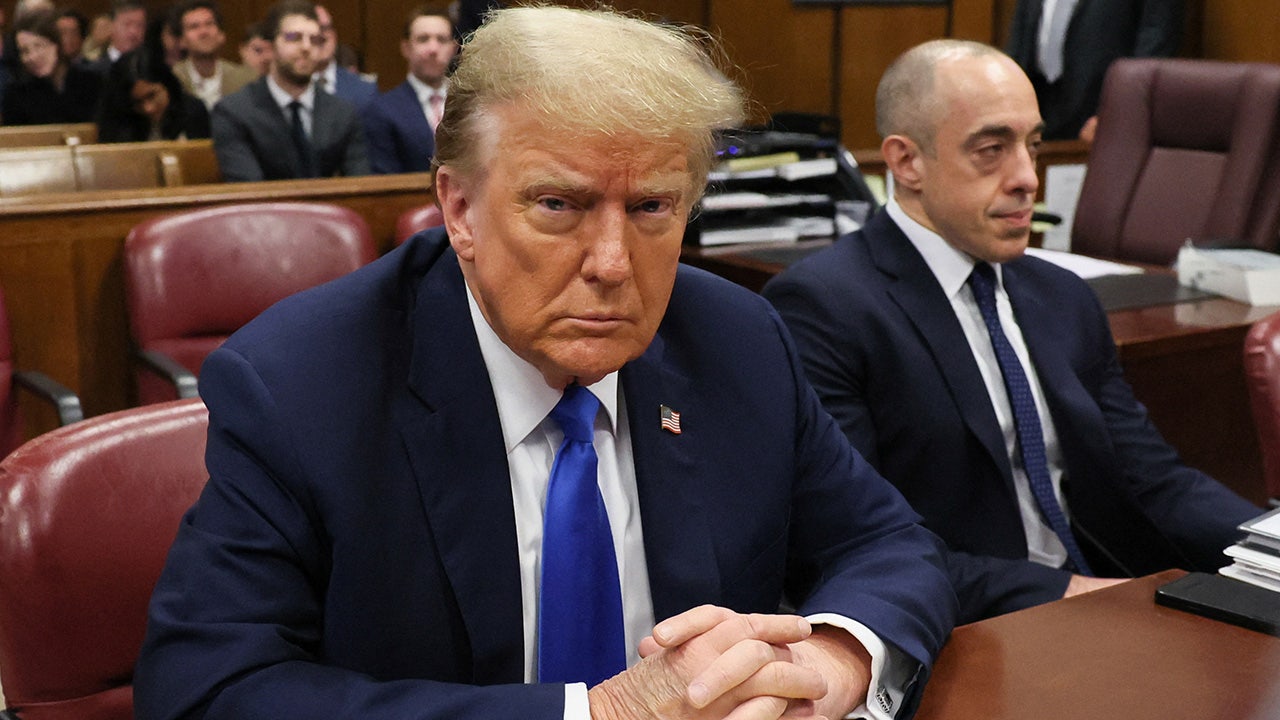World
Defense industry dollars flowed to a Democratic senator after he gained a key role on spending

WASHINGTON (AP) — As Democrat Jon Tester headed for a surprise victory in his 2006 U.S. Senate race, he attacked his incumbent Montana Republican rival’s close ties to lobbyists and committed himself to a rigorous ethics standard.
Now as he looks to win a fourth term in a race that could decide control of the Senate, Tester is embracing a practice he once held against his opponent: taking contributions from lobbyists and executives of corporations while helping craft a government spending package that directs billions of dollars.
After Tester became chair of the Senate Defense Appropriations subcommittee in 2021, he received campaign contributions totaling over $160,000 from employees and committees representing the defense industry. At one point last year, 49 Lockheed Martin executives and lobbyists — none of whom had given to the senator in the past — gave Tester’s campaign a combined total of nearly $50,000.
There is no indication the contributions swayed Tester’s decision making or that he committed any wrongdoing. But the donations came at a crucial juncture for both the defense budget and Lockheed Martin.
Senators at the time were crafting an $858 billion military package, and the Defense Department had submitted a late request for $1.4 billion for its F-35 fighter jet program after the cost for Lockheed to make the aircraft had overrun what was budgeted due to inflation and the pandemic. Without the extra funding, the previously approved planes were at risk of being canceled. The aircraft manufacturer was also looking to close out a multi-year deal with the Defense Department for the next round of its premier fighter jet.
Tester’s subcommittee successfully pushed to add $1.8 billion “for the restoration of all 19 at-risk aircraft,” according to an explanatory statement from the Senate Appropriations Committee.
Tester’s office declined interview requests with the senator for this story. Spokeswoman Sarah Feldman said in a statement, “Every decision he makes is based on one thing: what’s in the best interest of Montana and our national security, and he’ll never back down from defending the Montana way of life or defending this country from enemies that want to do us harm.”
Tester’s fundraising haul from federal contractors after he became chair of the Defense Appropriations Subcommittee is just a recent example of the way money flows to senior figures in Washington.
Most all lawmakers, Republicans and Democrats alike, accept campaign donations from lobbyists and corporations. Two other lawmakers who hold key roles on committees that determine military spending — Republican Sen. Roger Wicker of Mississippi and Democrat Rep. Rosa DeLauro of Connecticut — each took in more than $60,000 in campaign contributions from Lockheed employees last year.
In recent campaign cycles, Democrats have faced calls to reject checks from corporate political action committees. But Tester is also under reelection pressure as he faces a potentially challenging race back home in Montana, where his small-town farming roots and populist reputation have helped him survive the state’s increasingly conservative tilt.
Republicans tried to defeat Tester in 2018, attacking him for accepting money linked to corporations, but he still defeated the GOP nominee, Matt Rosendale, by four percentage points.
Rosendale is considered to be eyeing another run, as is Montana Republican Rep. Ryan Zinke, the former Interior secretary. Top Senate Republicans have also tried to recruit Tim Sheehy, a military veteran and CEO of a Montana-based provider of aerial firefighting and wildfire surveillance services, who could self-finance a campaign.
Tester has proven politically resilient, now as the only Democrat to hold statewide office in Montana.
Calling himself a “seven-fingered dirt farmer” after losing three fingers in a meat grinder as a child, Tester still returns home to work a farm in Big Sandy, Montana, that his family has held for three generations. When he is in Washington, he ambles the Capitol halls with a signature flattop haircut, seasons his statements to reporters with curse words and files bills aimed at “cleaning up” the lobbying industry as part of a mission to “reduce the power of big-moneyed interests in politics.”
He was among a group of Democrats who swept their party to the Senate majority in 2006, knocking off incumbent Republican Sen. Conrad Burns.
Tester in that race positioned himself as a fighter for the middle class who could take on a government that had become “an auction where the folks who get representation isn’t based on what’s right but who can write the biggest campaign check.”
Burns was linked through campaign contributions to lobbyist Jack Abramoff, who was convicted of conspiracy and fraud charges, and also faced scrutiny for working closely with lobbyists to craft spending packages.
In a 2006 debate, Tester accused Burns of casting “votes based on money that’s passed to you.”
“That is wrong, and it shows the fact that Sen. Burns has lost touch with Montana,” Tester said, adding: “Washington has changed him, it will not change me.”
After defeating Burns, Tester committed to having a judge conduct regular audits of his office’s relationships with interest groups. Feldman, Tester’s spokeswoman, said the audits have found no cause for concern, though a review for 2021 through 2022 has not yet been completed. Over the years, his office has intermittently released the reviews to the public.
Tester also abides by a commitment to post a public schedule of all the official meetings he takes, and in 2018 successfully proposed a requirement for senators to electronically file quarterly financial reports.
Feldman said those actions and others show he “holds himself to the highest standard of honesty, integrity and personal responsibility, going above and beyond his colleagues in Congress to crack down on lobbyist influence and increase accountability and transparency.”
The senator’s campaign touts his fundraising, which totaled $8 million since 2021, as a “grassroots effort” powered by Montanans. Tester has also received over $1 million from industry groups, including those representing the financial industry, pharmaceutical corporations, defense contractors and boutique lobbying firms.
Business interests have shown up on Tester’s list of campaign donors before. When he joined a bipartisan group of senators in 2018 to roll back bank regulations, he held meetings with executives from Bank of America, Citigroup, Discover and Wells Fargo, as well as dozens of Montana banks. That year, he received $302,770 from the banking industry.
Tester’s office said he has repeatedly pushed legislation that industry opposes, including by regulating pharmaceutical pricing, supporting enhanced safety regulations on railroads and working to increase competition among meatpackers.
Saurav Ghosh, who directs the Campaign Legal Center’s advocacy for campaign finance reform, said there’s nothing surprising about defense contractors donating to Tester’s campaign after he received a senior role crafting military spending.
“In some ways getting your voice heard in Washington often involves money,” Ghosh said, adding that corporate campaign committees and employees are within their rights to support candidates seen as friendly to their interests.
But he added: “When you take money from an industry that you’re responsible for regulating, that sends a message to the public that really calls into question whether you’re making policy decisions that are in the public’s best interest.”
The series of contributions to Tester from Lockheed employees came in November and December as Congress was crafting its broad military spending package. Among the programs at stake in the massive bill were 19 F-35 fighter jets that could have been cut from a Department of Defense contract with Lockheed Martin because the plane’s production costs had increased. The Pentagon in November requested that Congress provide $1.4 billion in the military’s budget to make up the funding shortfall.
Tester’s subcommittee included $1.8 billion to cover the higher production costs “once all relevant factors are considered,” though it also called for more congressional oversight of the F-35 program.
In a statement at the time, Tester praised the funding package for boosting pay, training and equipment for soldiers, as well as “shifting resources toward cutting-edge programs that’ll maintain our fighting edge over adversaries like China and Russia.” He also said the bill would bring $182 million to Montana universities and businesses with Defense Department contracts.
Tester has long pushed for robust military spending as well as medical care for veterans as a way to deliver for his home state, where the Malmstrom Air Force Base in Great Falls oversees the Minuteman missile program.
The expensive F-35 weapon system is seen by many lawmakers, including Tester, as crucial to keeping a fighting edge over potential adversaries. But the program has also faced criticism from some in Congress after repeated delays in its development.
Earlier in 2022, the military suggested, in an “unfunded priority list” — representing spending above the Defense Department’s proposed budget — adding still another 19 F-35 aircraft to the 61 it planned to purchase. At one point, Tester proposed adding six of those 19 jets to the budget, but Feldman, his spokeswoman, noted that by the end of the year, none of those additional jets made it into the final spending package.
Still, the spending package directed billions to defense contractors, Lockheed Martin among them. The corporation was looking to close a $30 billion, multi-year contract with the Defense Department for 398 F-35 aircraft. Congress also included funding for 16 of Lockheed’s C-130J Super Hercules aircraft in the legislation.
Lockheed Martin CEO James Taiclet, who gave $1,000 to Tester’s campaign in November, told investors in a year-end call that passage of the budget package was “positive for the future.”

World
Trump Moves to Delay Sentencing in Hush Money Case, Court Document Shows
World
Who is Pierre Poilievre? Canada's Conservative leader seeking to become next prime minister after Trudeau exit
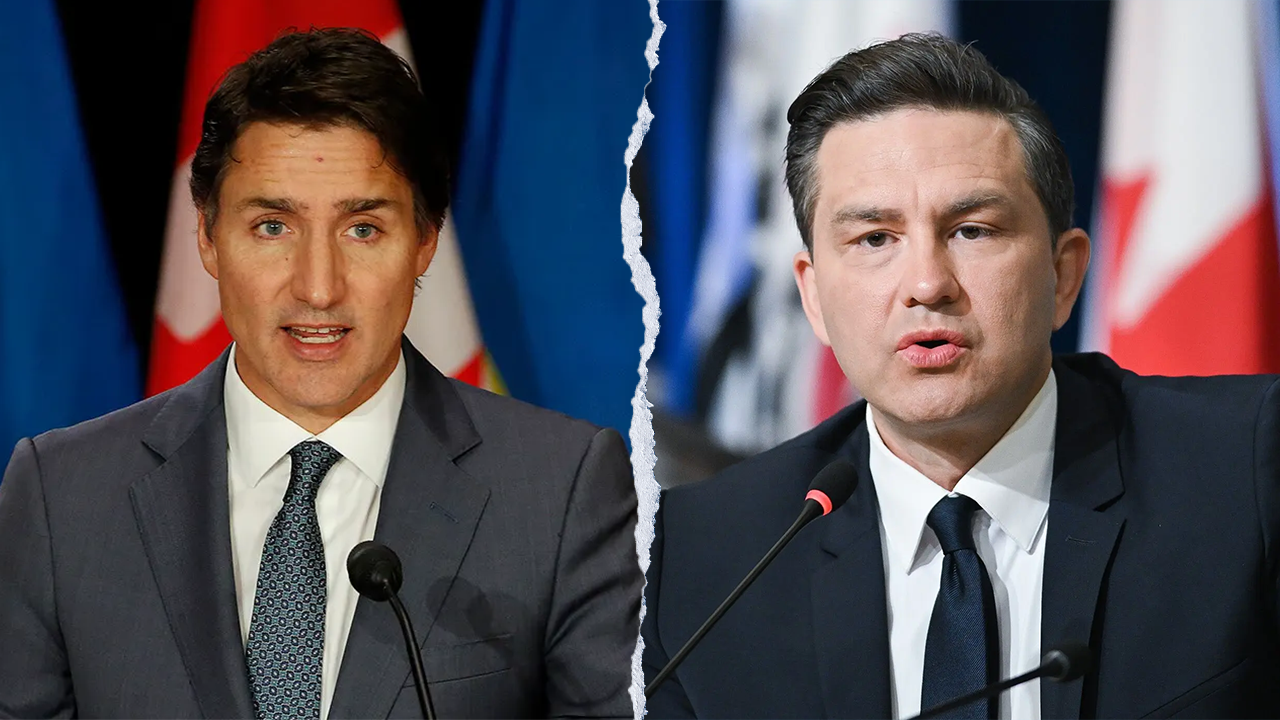
OTTAWA, Canada— With Canadian Prime Minister Justin Trudeau’s announcement on Monday morning that he will step down as Liberal Party leader, whoever succeeds him will face Official Opposition Leader Pierre Poilievre, whose Conservative Party has nearly three times the support of committed voters (47% compared to 18% for the Liberals) in this year’s general election.
First elected to the House of Commons in 2004, 45-year-old, Calgary-born Poilievre, 45, became leader of the Canadian Conservatives in 2022 and has seen his party grow in popularity as Canadians have grown tired of 53-year-old Trudeau, whose Liberals formed government in 2015.
“Bring home the Canadian dream” has been one of the Conservatives’ major themes, and Poilievre has cast the Liberals as governing with ‘an extremely radical ideology,’ which he described as “basically authoritarian socialism,” in a recent 90-minute interview with popular podcast host Jordan Peterson.
CANADA’S TRUDEAU ANNOUNCES RESIGNATION FOLLOWING PARTY PRESSURE AMID CRITICISMS OF TRUMP, BUDGET HANDLING
Leader of Canada’s Conservative Party, Pierre Poilievre, speaks during a ‘Spike the Hike – Axe the Tax’ rally in Edmonton, on March 27, 2024, in Edmonton, Alberta, Canada. (Artur Widak/NurPhoto via Getty Images)
“People are sick and tired of grandiosity,” said Poilievre. “Horrendous, utopian wokeism” serves, he said, “egotistical personalities on top,” rather than “common people.”
Trudeau has said that Poilievre wants to “make Canada great again,” comparing the Tory leader to incoming U.S. President Donald Trump and his “Make America Great Again” mantra.
But while Poilievre’s populist messaging has generated comparisons to Trump’s political approach, the Canadian Conservative leader has pushed back the president-elect’s recent comments about making Canada the 51st state.
“I have the strength and the smarts to stand up for this country and my message to incoming President Trump is that first and foremost, Canada will never be the 51st state of the U.S.,” Poilievre said in an interview with Canadian broadcaster, CTV News, before Christmas.
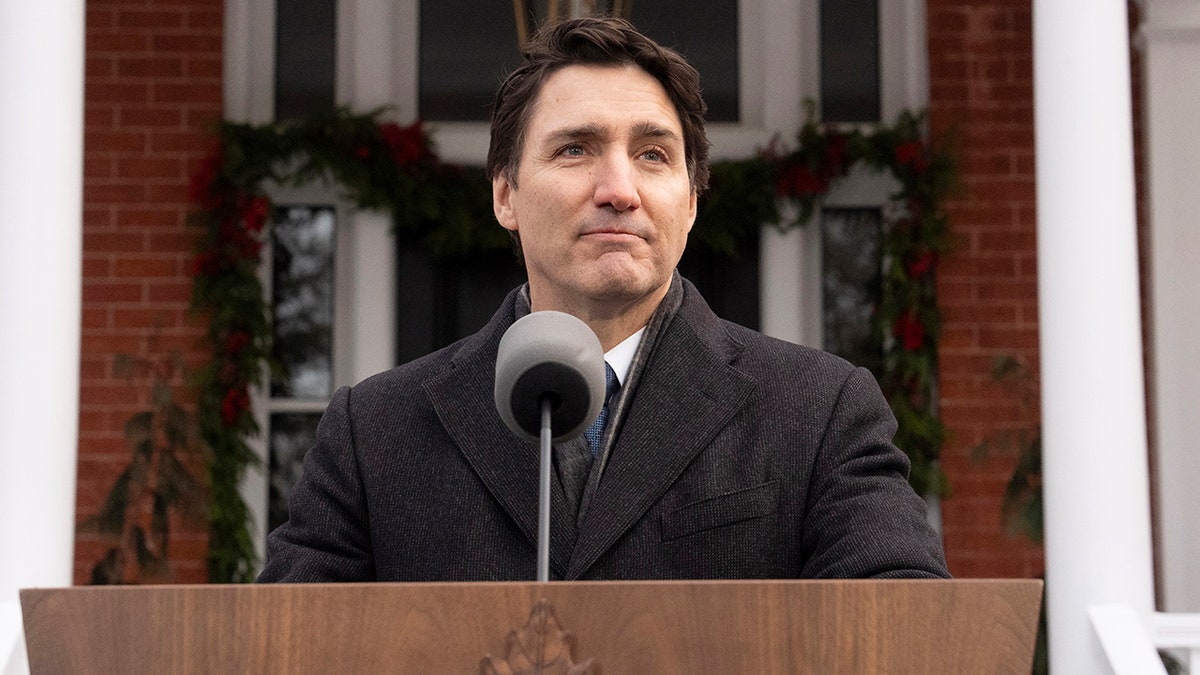
Canada Prime Minister Justin Trudeau speaks with media outside Rideau Cottage on Monday, Jan. 6, in Ottawa. (AP/Adrian Wyld/The Canadian Press)
The incoming Trump administration will almost assuredly deal with a Poilievre government as the Conservatives are poised to win the next Canadian election, which could come as early as this spring. When the House of Commons resumes sitting on March 24, the opposition parties are likely to defeat the minority Liberal government in a vote of no-confidence, which would trigger a national vote.
In his Peterson interview, Poilievre acknowledged that Trump — who has proposed a 25% tariff against Canadian exports — “negotiates very aggressively, and he likes to win.” But as prime minister, the Conservative leader said that he would seek “a great deal that will make both countries safer, richer and stronger.”
TRUMP SAYS US SUBSIDIES TO CANADA MAKE ‘NO SENSE,’ SUGGESTS CANADIANS WANT ‘TO BECOME THE 51ST STATE’
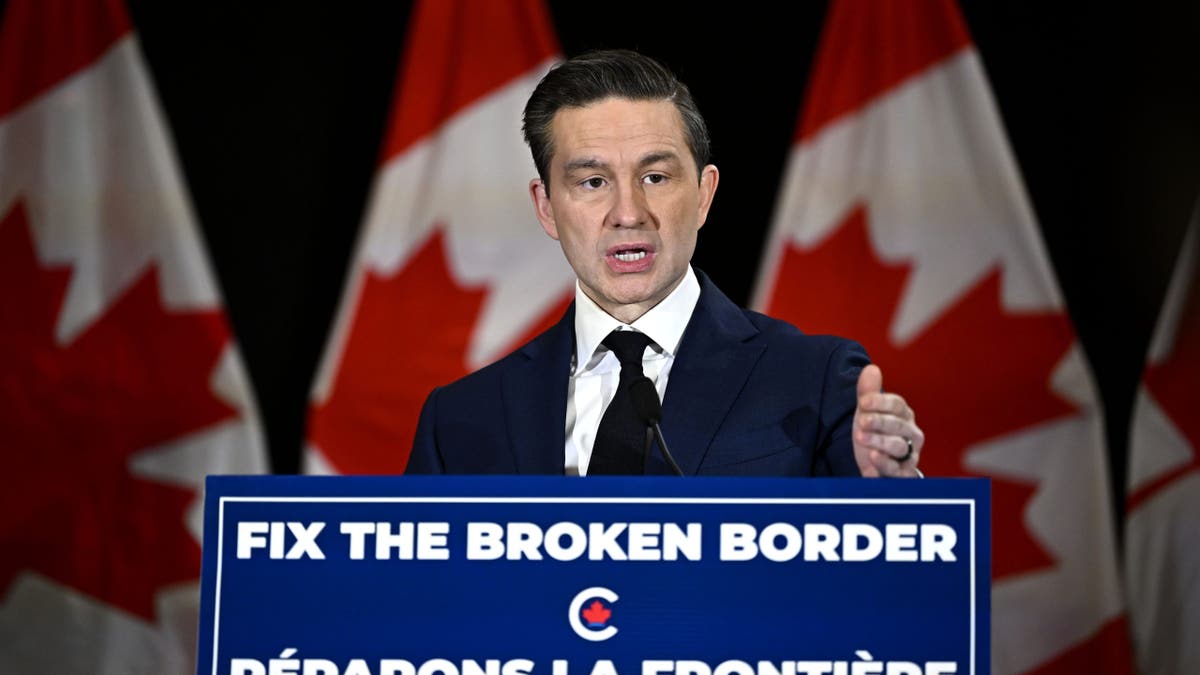
Canada Conservative Leader Pierre Poilievre holds a news conference in a hotel ballroom in Ottawa, on Sunday, Dec. 1, 2024. (ustin Tang/The Canadian Press via AP)
Poilievre said that he would accelerate approvals to build oil refineries, liquefied natural gas plants and nuclear facilities, and increase its electricity surplus with the U.S.
He also told Peterson that Canada sells its oil and gas to the U.S. at “enormous discounts,” which he characterized as a “ripoff,” in which “Canada is ripping itself off.”
A Poilievre-led government would also embark on “the biggest crackdown on crime in Canadian history” and that “habitual offenders will not get out of jail anymore,” the Conservative leader said.
On foreign affairs, the Canadian Conservatives’ 2023 policy document states that it would, as government, “take the required steps to renegotiate the Safe Third Country Agreement with the U.S. to close the gaps relating to illegal entries in Canada,” and that the Conservative Party recognizes Jerusalem as the capital of Israel. Canada’s embassy in Israel is currently in Tel Aviv.
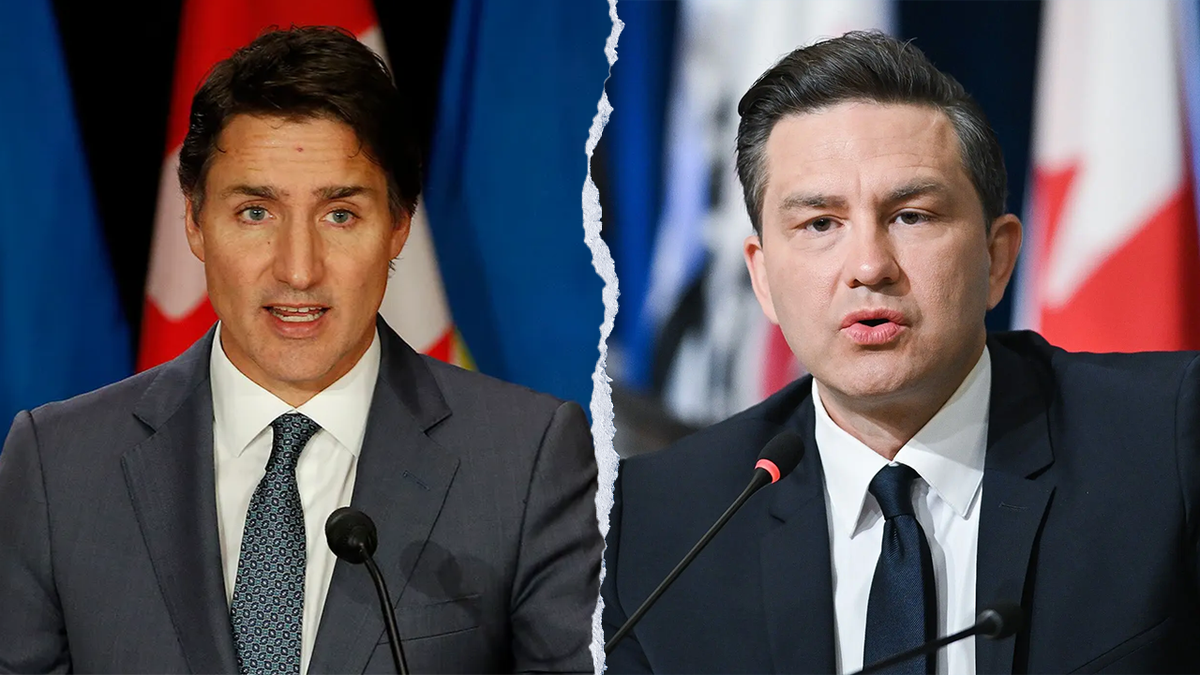
Outgoing Canadian Prime Minister Justin Trudeau
|Photo: David Kawai/Bloomberg via Getty Images. Canadian opposition leader, Pierre Poilievre, (R)
Photo: Graham Hughes/Bloomberg via Getty Images (Getty Images)
In a statement released in response to Trudeau’s resignation on Monday, Poilievre said that “this changes nothing” and that a Conservative Canadian government would “take back control of our border, take back control of immigration, take back control of spending, deficits and inflation. Take back control of our streets by locking up criminals, banning drugs, treating addiction and stopping gun smugglers.”
The Conservatives, added Poilievre, “would secure borders, rearm our forces, restore our freedom and put Canada First.”
World
US Congress certifies Donald Trump’s victory in 2024 presidential election

The quiet proceeding contrasts with efforts by Trump’s own supporters to overturn his 2020 loss by storming the US Capitol.
The United States Congress has certified Donald Trump’s victory in November’s presidential election, clearing a final hurdle for his return to the White House later this month.
Monday’s ceremony in Congress officially validated the 2024 Electoral College results.
Overseen by Vice President Kamala Harris, Trump’s main rival in the election, the event passed quickly and with little fanfare.
“Today was obviously a very important day,” Harris, who also serves as the president of the Senate, said in remarks afterwards.
“It was about what should be the norm and what the American people should be able to take for granted, which is that one of the most important pillars of our democracy is that there will be a peaceful transfer of power.”
The largely procedural affair marked a stark contrast with the last time Congress convened to certify Electoral College votes, on January 6, 2021.
During that ceremony, thousands of Trump’s supporters stormed the US Capitol in an effort to overturn then-President Trump’s defeat in the 2020 election.
Lawmakers were forced to evacuate as doors were smashed, police officers were attacked and one protester was shot to death while trying to enter a chamber through a broken window.
The attack took place after Trump held a rally nearby on the Ellipse, a park south of the White House, where he reiterated false claims that the election had been stolen through massive fraud.
Critics roundly condemned the attack as an assault on democracy, and the US Department of Justice has since charged 1,583 participants with federal crimes.
As of Monday, approximately 1,009 have pleaded guilty, with 327 offering guilty pleas to felony charges.
Trump himself faced two criminal indictments for his role in trying to overturn the 2020 election results: A federal case in Washington, DC, was recently dismissed, while a state-level case in Georgia is stalled but ongoing.
Nevertheless, four years later, Trump is set to return to power on the heels of his most successful presidential campaign to date.
In November, Trump won 312 Electoral College votes to Harris’s 226 and became the first Republican candidate to win the popular vote since 2004.
Trump’s Republican Party will also take control of Congress after winning majorities in both the House of Representatives and the Senate.
Many in the party have since embraced the Republican leader’s false claims about the 2020 election.
“Congress certifies our great election victory today – a big moment in history. MAGA!” Trump wrote on his platform Truth Social on Monday, using an acronym for his slogan, “Make America Great Again”.
Harris, meanwhile, urged respect for the tenets of US democracy. She cited Monday’s peaceful certification as an example of the right way forward.
“I do believe very strongly that America’s democracy is only as strong as our willingness to fight for it,” she said. “Otherwise it is very fragile, and it will not be able to withstand moments of crisis.”
-

 Health1 week ago
Health1 week agoNew Year life lessons from country star: 'Never forget where you came from'
-
/cdn.vox-cdn.com/uploads/chorus_asset/file/24982514/Quest_3_dock.jpg)
/cdn.vox-cdn.com/uploads/chorus_asset/file/24982514/Quest_3_dock.jpg) Technology1 week ago
Technology1 week agoMeta’s ‘software update issue’ has been breaking Quest headsets for weeks
-

 Business6 days ago
Business6 days agoThese are the top 7 issues facing the struggling restaurant industry in 2025
-

 Culture6 days ago
Culture6 days agoThe 25 worst losses in college football history, including Baylor’s 2024 entry at Colorado
-

 Sports5 days ago
Sports5 days agoThe top out-of-contract players available as free transfers: Kimmich, De Bruyne, Van Dijk…
-

 Politics4 days ago
Politics4 days agoNew Orleans attacker had 'remote detonator' for explosives in French Quarter, Biden says
-

 Politics4 days ago
Politics4 days agoCarter's judicial picks reshaped the federal bench across the country
-

 Politics2 days ago
Politics2 days agoWho Are the Recipients of the Presidential Medal of Freedom?




